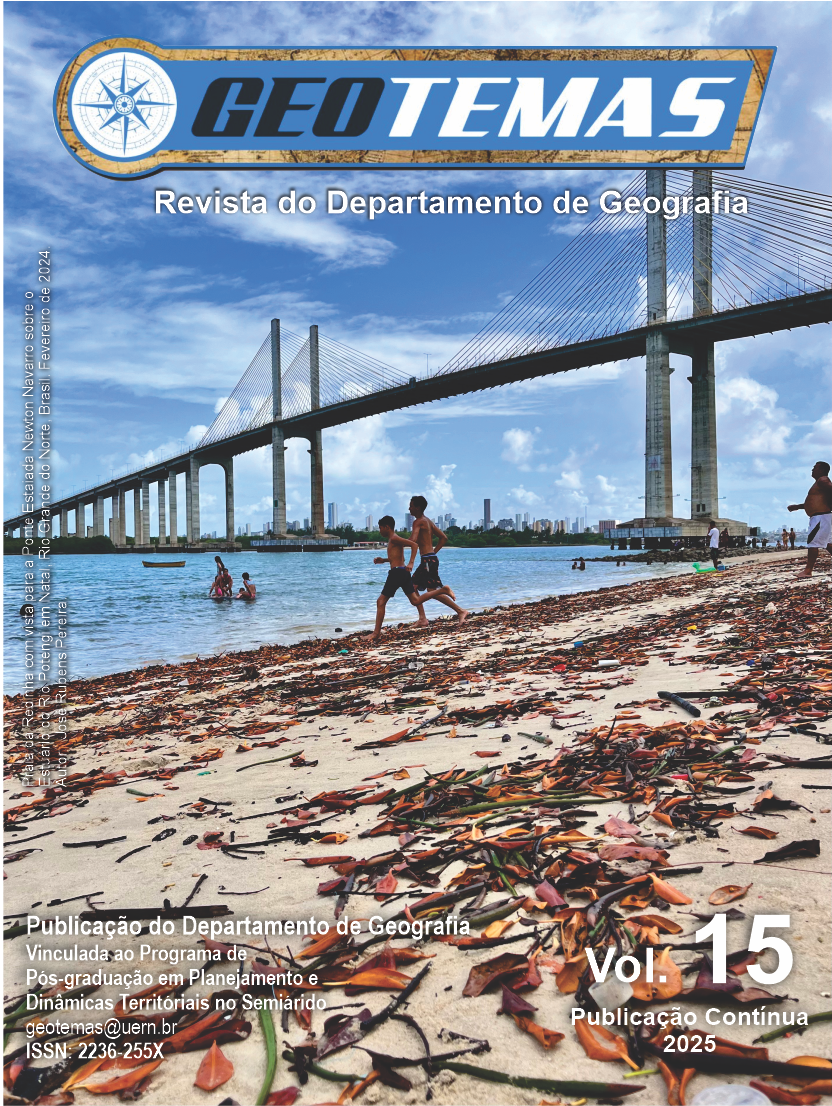The relevance of political-geographical position and situation in Friedrich Ratzel
DOI:
https://doi.org/10.33237/2236-255X.2025.6830Keywords:
Friedrich Ratzel, Situation, Position, TerritoryAbstract
The present study aims to revisit a concept proposed by Friedrich Ratzel (1844–1904) during his academic career. As the author of works such as "Anthropogeographie" and "Politische Geographie," Friedrich Ratzel developed an extensive theoretical and methodological framework that played a significant role in advancing and consolidating geographical science. This study seeks to evaluate the dialectical pair found in the concepts of political-geographical position and situation as presented in Ratzel's works, which highlight the enduring relationship between society and nature, revealing the core of studies in Geography, Political Geography, and Geopolitics. These concepts are primarily found in Kleine Schriften von Friedrich Ratzel (Small Writings of Friedrich Ratzel), a posthumous work organized by Hans Helmolt in 1906. Themes such as the interactions between humans and the environment, State, society, and territory, as well as the formulation of the principle of territorial extension at different scales of analysis, stand out as some of Ratzel's main contributions and guide the discussion of this article. His works offer broader approaches than the mere location of a territory, and Ratzel's reflections remain relevant and essential for contemporary geographical studies, making the revival of his ideas critical for understanding the very essence of Geography. Through readings, bibliographical consultations, and hermeneutic interpretation, it was concluded that the concepts of geographical position and situation can serve as tools for the development of public policies, logistical strategies, and transportation planning, contributing to better territorial organization.
Downloads
References
BACHELARD, G. A formação do espírito científico: contribuição para uma psicanálise do conhecimento. Rio de Janeiro: Contraponto, 1996.
BACKHEUSER, E. Problemas do Brasil: estrutura geopolítica: o espaço. Rio de Janeiro: Omnia, 1933.
BASSIN, M. Friedrich Ratzel (1844-1904). Geographers. Biobibliographical Studies, v. 11, p. 123-132, abr. 1987.
CARVALHO, M. B. de. Geografia e Complexidade. Scripta Nova. (Revista Eletrônica de Geografia y Ciências Sociales), n. 34, p. 32-54, fev. 1999.
CARVALHO, M. Friedrich Ratzel (1844-1904): “O insípido está sempre incorreto”. GEOgraphia, v. 12, n. 23, p. 140-156, mar. 2010.
CATAIA, M. A. Território Nacional e Fronteiras Internas: a fragmentação do território brasileiro. Tese (Doutorado em Geografia) - Universidade de São Paulo, São Paulo, 2001.
CATAIA, M. A. Território, territorialidade e fronteira: o problema dos limites. Urbe. Revista Brasileira de Gestão Urbana, vol 9, n. 1, p. 9-19, jan. 2017.
DUSSOY, J. Die neue Attraktivität der Geopolitik in Frankreich. Berlim: Springer Professional, 2000.
KORINMAN, M. Quand l'Allemagne pensait le monde: Grandeur et décadence d'une géopolitique. Paris: Fayard, 1990.
MARTINS, L. Friedrich Ratzel através de um prisma. Dissertação (Mestrado em Geografia) - Universidade Federal do Rio de Janeiro. Rio de Janeiro, 1993.
MORAES, A. Ratzel: Coleção Grandes Cientistas Sociais. São Paulo: Ática, 1990.
MORIN, E. Introdução ao Pensamento Complexo. Porto Alegre: Sulina, 2005.
OLIVEIRA, R.; SEEMANN, J. A geografia mora nos detalhes e no todo. GEOgraphia, v. 23, n. 51, p. 1-12, 2021.
PEREIRA, S. Sobre a Situação Geográfica de Ratzel: breve nota. Revista da Rede Brasileira de História da Geografia e Geografia Histórica, n. 15, 2021.
RATZEL, F. Anthropogeographie. erster teil: grundzüge der anwendung der erdkunde auf die geschichte. Stuttgart: Verlag von j. Bngelhorn, 1909 [1898-1899].
RATZEL, F. Kleine Schriften von Friedrich Ratzel. In: HELMOLT, H. (org.). Kleine Schriften von Friedrich Ratzel, Munique: Oldenbourg, 1906.
RATZEL, F. Las Razas Humanas. Barcelona: Montaner y Simon, 1888 [1885].
RATZEL, F. O espaço da vida: um estudo biogeográfico. GEOgraphia, v. 21, n. 45, p. 107-116, jun. 2019
RATZEl, F. O Solo, a Sociedade e o Estado. Revista Do Departamento De Geografia, vol. 2, p. 93-101, nov. 2011.
RATZEL, F. Politische Geographie. Munique: Oldenbourg, 1897.
RATZEL, F. Sobre a narração da natureza. GEOgraphia, v. 23, n. 51, p. 1-13, set. 2021. [1906].
RATZEL, F. Ubicacion y espacio. In: RATTENBACH, A. B. Antologia geopolítica. Buenos Aires: Editorial Pleamar, 1975.
RODRIGUES, L. Geopolítica do Brasil. Rio de Janeiro: Biblioteca Militar, 1947.
SEEMANN, J; PEDROSA, B. Friedrich Ratzel e a alma do povo da América do Norte. Espaço e Cultura, n. 46, p. 137-146, jul. 2019.
SEMPLE, E. Influences of Geographic Environment on the Basis of Ratzel´s System of AnthropoGeography. Nova Iorque: Henry Holt and Company, 1911.
SILVA, G. Geopolítica do Brasil. 2 ed. Rio de Janeiro: José Olympio Editora, 1967.
SILVEIRA, M. R. Circulação, Transportes e Logística no Brasil: Inserção Internacional, Permanências e Diversidades na Reorganização Territorial. Revista Da Anpege, vol. 18, n. 36, p. 633-657, out. 2022.
SODRÉ, N. Introdução à Geografia. Petrópolis: Vozes, 1976.
STOGIANNOS, A. The Genesis of Geopolitics and Friedrich Ratzel: Dismissing the Myth of the Ratzelian Geodeterminism. Switzerland: Springer Nature, 2019.
TRAVASSOS, M. Projeção continental do Brasil. 3. ed. São Paulo: Companhia Editorial Nacional, 1938.
Downloads
Published
How to Cite
Issue
Section
License
Copyright (c) 2025 Journal Geotemas

This work is licensed under a Creative Commons Attribution 4.0 International License.
Authors who submit their manuscripts to Geotemas declare that the work is an original article and has not been submitted for publication, in full or in part, in another national or international scientific journal or in another circulation vehicle. The authors also declare that they agree with the transfer of the copyright of the referred article to the magazine Geotemas (University of the State of Rio Grande do Norte), allowing for later publications, as long as the source of its publication is assured. Finally, they assume public responsibility for the article, being aware that any charges arising from a claim by third parties regarding the authorship of the work may apply to them.





















